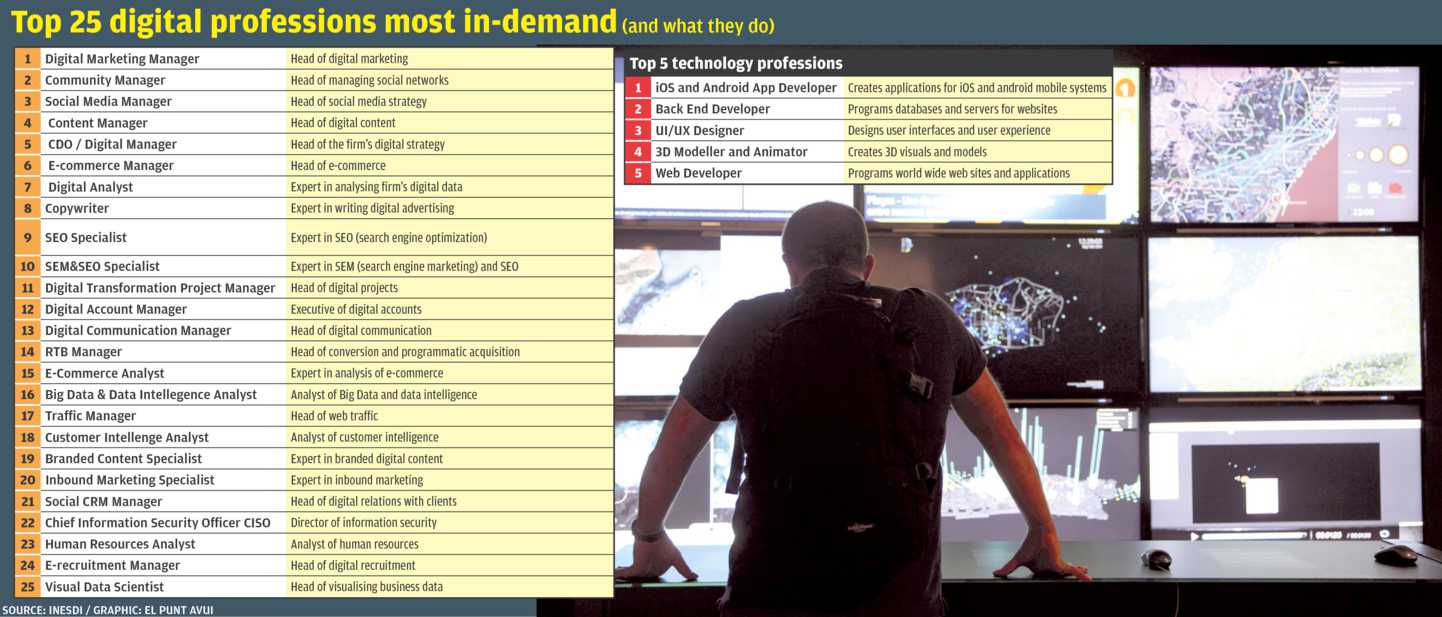Digital talent wanted
On average, some 64% of vacant posts are not posted online or advertised
There is a growing demand for professionals in digital marketing, social media and digital strategy
You could be excused for wondering what a digital marketing manager, community manager, social media manager or content manager does, but they were the four professions most in-demand in 2016. The need for professionals in the information technology and digital sectors is growing, and companies are having a tough time filling vacancies.
Judith Monmany, communication head at Infojobs, points out that 16.5% of job vacancies are posted online, with most ads for professionals in telecommunications and computer technology specialisations. In the last year, she says, these vacancies have grown by 6%, although in 2015 the rise was 42%. What's more, we must bear in mind that most vacancies are never even posted, and are filled through personal contacts.
For Ana Sánchez-Blanco, academic director of the digital business school Inesdi, there is growing specialisation among vacancies because “companies know that they need to fill specific positions.” The school, which every year draws up a ranking of the 25 digital professions most in-demand, puts the four aforementioned professions at the top and include, among others, CDO (chief digital officer), director of ecommerce, digital analyst, digital copywriter, SEO (Search Engine Optimization) and SEM (Search Engine Marketing) specialists, which are experts at coming up with digital marketing campaigns and making sure the company is listed high up on searches in the most important search engines.
A study of 300 job offers from Inesdi's job listings and specialist positions handled by the digital and tech headhunter, Indigital Advantage, found there is growing specialisation among tech posts “reflecting an increasingly mature market, in which the profile of digital marketing manager remains the most sought after and with community manager, social media manager, content manager and CDO making up 62% of vacancies,” says a spokesperson.
Specialisation
“Firms are not mature enough,” says Sánchez-Blanco. “An expert in SEO is not the same as a digital analyst or a digital advertising expert, even though there are links,” she says. So when companies look for professionals, the most specialised find work more easily. “Yet, companies must understand that if they want a good professional, they have to pay,” she warns.
A sign of a lively job market, says the expert, is that when it comes to job offers, candidates look more carefully at the company profile and whether it offers the best chance for personal growth. Average salaries, according to Inesdi estimates, are between 80,000 and 200,000 euros a year for a digital strategy head, from 25,000 to 45,000 for SEO and SEM specialists, and between 50,000 and 120,000 for a digital marketing head. The worst paid is community manager, with annual salaries between 22,000 and 30,000 euros.
“A lot of companies are worried about the digital issue, because they do not understand it well,” she says. This is not so strange, as the figures in the Digital Economy and Society Index (DESI) for 2016, from the European Commission, shows. Despite rising two places every year in the list, Spain is 15 out of 28 EU member states in the DESI. Although 77% of households in Spain have high bandwidth thanks to improvements in communication infrastructure, knowledge of digital technology lags behind: only 54% of citizens have basic digital skills. Worse still, Spain is 21st when it comes to the number of information and communication technology (ICT) specialists. Meanwhile, Finland, Sweden, the UK and Luxembourg top the list.
Problems
Jesús Camas, head of job hunting at Barcelona Activa, admits there is a problem. “For some time now demand has outstripped supply in these technological professions,” he says. Yet, the bigger problem, for Camas, is that the demand from companies cannot be covered locally and that could affect future foreign investment in the sector in Barcelona and Catalonia and thus weaken the existing ecosystem. “At Barcelona Activa we try to foster technological vocations because the problem is basic,” he says. “We can't have only 12% or 15% of women with an interest in these types of jobs,” he adds, explaining that the Barcelona city council is working to resolve this lack with more information on educational and professional possibilities.
The general manager of the Col·legi d'Enginyers de Catalunya, Pere Homs, points out that the demand for engineers has grown 50% in the past 12 months and that the demand from the information and mobile technology sectors has grown even more. “The demand has shot up because the need is for specialists, though we should not forget that one of the best ways to find specialists is for the company to provide the training,” he says. “We all need to rethink; it is not logical for there to be a hundred masters and a hundred undergraduate degrees in Catalonia in engineering specialities. We may have overdone it a little,” he reflects.
Many job offers for qualified profiles are never made public and end up being filled by the so-called ‘hidden job market'. These are vacancies that companies prefer not to advertise and end up covered by their own recruitment sources, whether it be databases, intermediaries, trusted individuals or by headhunting professionals from the competition by offering a better deal.
According to consultancy Lee Hecht Harrison, in Catalonia some 64% of these job vacancies are filled by the hidden job market (63% in Spain as a whole), with this figure rising higher still in certain sectors. So, in the case of the information and communication technology sector (ICT), 78% of posts are filled by the hidden job market, similar to the pharmaceutical industry, in which the figure stands at 79%.
According to the experts, for tech and digital posts it is important that candidates take great care of their personal brand and network of contacts. “The need to fill specific job vacancies and mostly those related to new technology means that online professional networks have become the ideal place to find talent and incorporate it into the staff,” says a study by Lee Hecht Harrison, a division of the Adecco group.
Among the reasons for a company to hide a vacancy is the firm's business strategy and the unwillingness to provide the competition with any clues about areas they may be strengthening or changes of direction the company may be considering.
A study commissioned by the association of internationalized industrial enterprises, Amec, on the profiles and skills required for internationalisation recognises that “the main source of attracting talent for internationalisation is internal promotion,” and while being a tool mostly used by larger companies, “Spanish companies suffer from a lack of experience when it comes to identifying talent within the organisation itself.” Yet, the study recognises that “attracting talent through networking, especially for technical middle-management posts, is gaining ground.”




